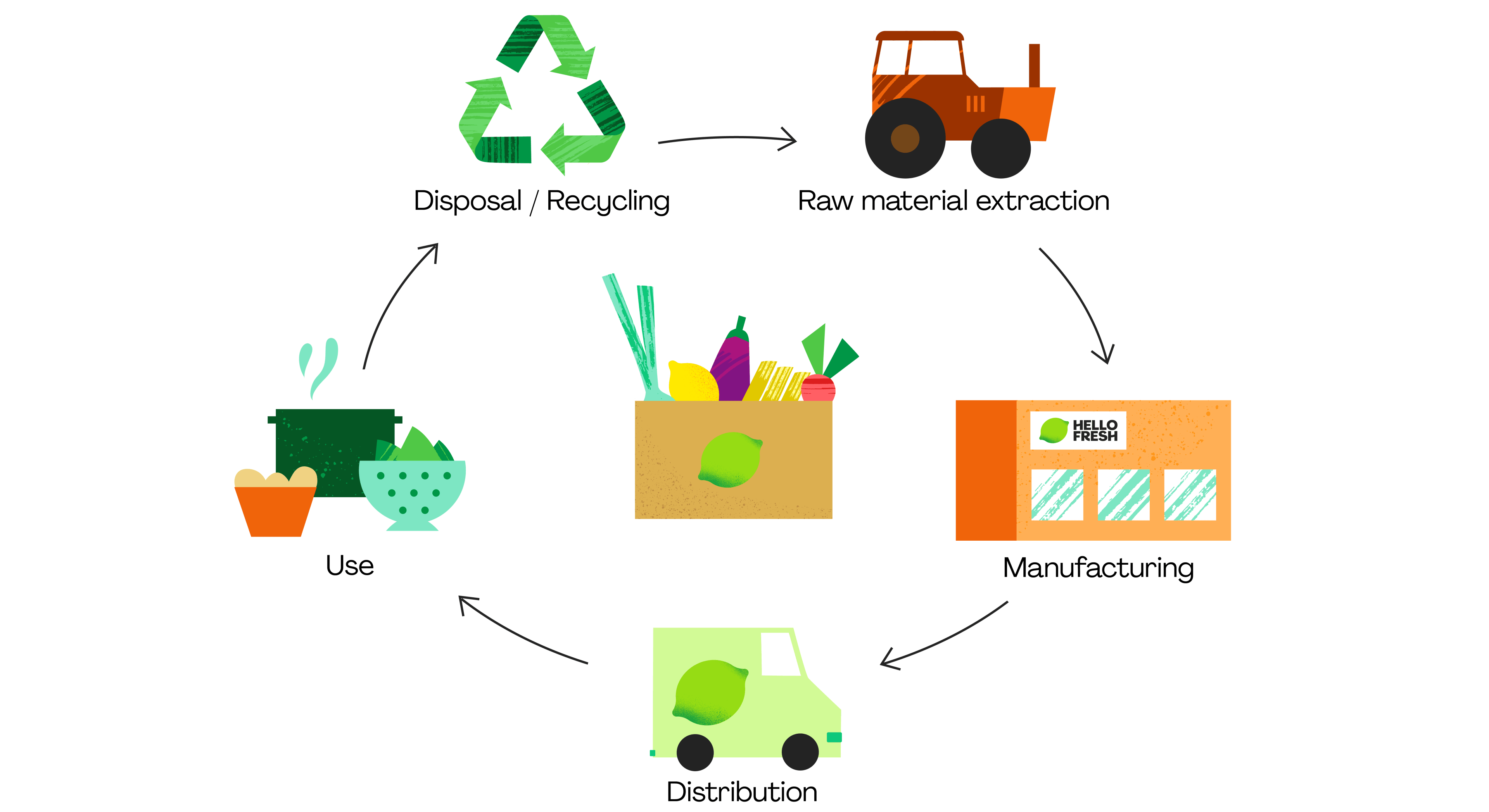25%* fewer carbon emissions than the supermarket
25%* fewer carbon emissions than the supermarket
Your HelloFresh meals create 25%* fewer carbon emissions than the same meals made from supermarket ingredients.
*On a global average; national levels differ.
Your HelloFresh meals create 25%* fewer carbon emissions than the same meals made from supermarket ingredients.
*On a global average; national levels differ.

Our short supply chain
Ingredients are by far the biggest contributor to carbon emissions in our supply chain. Unlike supermarkets and restaurant delivery services, HelloFresh has an extremely short supply chain. We eliminate extra stops along our transport routes and favour local ingredient sourcing, which means ingredients travel for less time and avoid unnecessary food waste along the way.

-25%* CO2 than the supermarket
Because of this, HelloFresh meals result in fewer emissions than similar meals from restaurant deliveries or supermarkets as indicated by an ISO 14040-compliant LCA study completed in April 2022: On a global average, a HelloFresh meal has 25% lower carbon emissions than a similar meal made with ingredients purchased from the supermarket, and 5.5% lower than a meal delivered from a restaurant.
*On a global average; national levels differ.

Our short supply chain
Ingredients are by far the biggest contributor to carbon emissions in our supply chain. Unlike supermarkets and restaurant delivery services, HelloFresh has an extremely short supply chain. We eliminate extra stops along our transport routes and favour local ingredient sourcing, which means ingredients travel for less time and avoid unnecessary food waste along the way.

-25%* CO2 than the supermarket
Because of this, HelloFresh meals result in fewer emissions than similar meals from restaurant deliveries or supermarkets as indicated by an ISO 14040-compliant LCA study completed in April 2022: On a global average, a HelloFresh meal has 25% lower carbon emissions than a similar meal made with ingredients purchased from the supermarket, and 5.5% lower than a meal delivered from a restaurant.
*On a global average; national levels differ.

What is a Life Cycle Assessment Study?
HelloFresh commissioned an ISO 14040 compliant and peer-reviewed life cycle analysis (LCA) study that demonstrated how cooking with HelloFresh produces fewer carbon emissions than both restaurant delivery services and cooking with ingredients from the supermarket.
This case study was based on an analysis of meal kits from three different protein categories (beef, chicken and vegetarian recipes) provided by HelloFresh in four regional markets, representing 80% of HelloFresh’s total 2020 annual volume:
- Belgium, Netherlands and Luxembourg;
- Germany and Austria;
- United States of America;
- Australia.

What is the LCA study scope?
The study compared the environmental impacts to meals created by ingredients purchased at supermarkets, and to similar meals purchased from restaurant delivery services. The scope of the study includes the entire lifecycle, from the production of the meal’s ingredients to the packaging materials and the waste treatment on an operational level.In every researched market, meals created with HelloFresh had a lower climate impact compared to those bought in supermarkets and from restaurant deliveries. In both cases, the HelloFresh meals had a lower GWP (global warming potential). Based on this information and several other factors, including sales data and market split, we calculated a weighted average for every market and overall global operations.

How did we calculate the results?
To calculate the global average of the carbon emissions for every meal, beyond an average impact (kgCO2e) of each protein meal for each provision system provided by the study, we took into account several factors, including sales data and market split.To obtain the global average carbon emissions per meal, we first calculated an average of the carbon impact of each protein meal, weighted by the meals sold in 2020 in the four regional markets considered. For example, the impact of a beef burger from HelloFresh varies between 6.3 kgCO2e to 7.4 kgCO2e across different markets (HelloFresh LCA study, page 13).
By creating an average of this range, weighted by the numbers of meals sold in each region, we obtained a global average impact of 6.9 kgCO2e for the beef burger meal. Then we averaged the obtained global impacts of the three meal types, weighted by the volumes of protein types sold in the same year.

On a global average, the carbon emission of HelloFresh meals are 5.5% lower in comparison to the ones of restaurant delivery and 25% lower in comparison to supermarkets’, indicating that HelloFresh recipes have an overall lower impact on the climate.
Learn more about the Life Cycle Assessment study.
